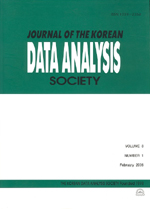남자대학생의 음주결과기대, 대인관계능력 및 우울이 문제음주에 미치는 영향
Influence of Alcohol Outcomes Expectancy, Interpersonal Reaction and Depression on Problem Drinking among Male University Students
- 한국자료분석학회
- Journal of The Korean Data Analysis Society (JKDAS)
- Vol.18 No.1
-
2016.02537 - 548 (12 pages)
- 101

본 연구의 목적은 남자대학생들을 대상으로 음주결과기대, 대인관계능력 및 우울이 문제음주에 미치는 영향을 파악하고자 시행한 서술적 조사연구이다. 자료수집은 남자 대학생 288명을 대상으로 설문지를 이용하여 실시하였다. 수집된 자료는 SPSS Win을 이용하여 빈도와 백분율, 평균과 표준편차, 상관관계분석, 다중회귀분석으로 분석하였다. 본 연구변수들을 분석한 결과, 남자대학생의 71.5%가 문제음주자였으며, 대상자의 음주결과기대(0~50점)는 25.40점, 대인관계능력(40~160점)은 114.36점, 우울(0~60점)은 16.71점, 문제성음주(0~39점)는 18.80점이었다. 연구대상자의 일반적 특성에 따른 문제음주정도는 연령(p=.029), 학년(p<.001), 거주지(p=.015)에서 유의한 차이를 보였다. 음주결과기대, 대인관계능력, 우울, 문제음주의 상관관계에서 문제음주는 음주결과기대(r=.471, p<.001), 대인관계능력(r=.137, p=.020)과 정적관계를 보였으며, 문제음주와 우울(r=-.246, p<.001)은 부적관계가 있었다. 문제음주에 대한 일반적 특성 (연령, 학년, 거주지)및 음주결과기대, 대인관계능력, 우울에 대한 설명력은 35.0%였다. 본 연구결과를 통해 남자대학생을 위한 문제음주 예방 프로그램 개발 시 문제음주에 가장 큰 영향을 미치는 음주결과기대 감소를 위한 예방교육이 필요할 것으로 보인다.
The purpose of this study was to examine the influence of alcohol outcomes expectancy, interpersonal reaction and depression on problematic drinking among male university students. This study was conducted using a descriptive survey design. Data were collected from 288 male university students by using a questionnaire. Data were analyzed by frequency, percentage, mean, standard deviation, t-test, ANOVA, Pearson correlation coefficient and multiple regression using SPSS Win. Of the participants, 71.5% were in problematic drinking. Problematic drinking was positive correlated alcohol outcomes expectancy and interpersonal reaction, but depression was a negative correlation to the problem drinking. The predicting factors of problem drinking were age, grade, alcohol outcomes expectancy and depression. The variables explained the problem drinking by 35.0%. Based on the findings, problem drinking prevention programs should be developed to decrease alcohol outcomes expectancy in order to prevent problem drinking among male university students.
1. 서론
2. 연구방법
3. 연구결과
4. 논의
5. 결론
References
(0)
(0)